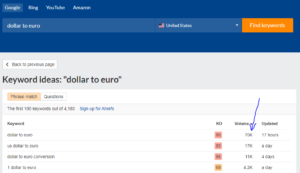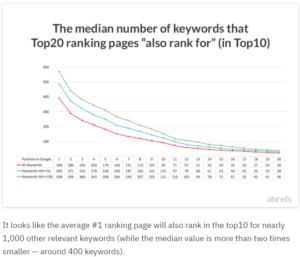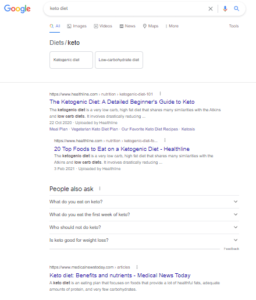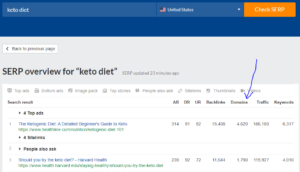In the context of SEO, keywords are words and phrases that people type into search engines to find what they are looking for. For example, if you are searching for a face cap, you might search for keywords like face cap for ladies or simply type face cap. Keywords are super important in SEO because they set the foundation for search engine optimization. The primary work of SEO is to rank your pages for keywords that your target audience or customers are searching for. And if you are not ranking for keywords that are actually getting searched, then your SEO efforts are kind of meaningless. For example, you rank number one for a query Pizza Recipe, and this keyword is responsible for driving around 1700 monthly visitors from Google, and that’s just from the US. So keyword research is the process of finding keywords that people are inputting into search engines.
HOW TO CHOOSE KEYWORDS THAT IS WORTH TARGETING
Below is a checklist that should help you choose keywords effectively
-
Check if the keyword has search-demand
Search-demand represents the volume of monthly searches made for a keyword. It is measurable with the keyword metric that is known as search volume. You can find the search volume of a keyword by using any keyword research tool like the Ahrefs keywords explorer or the Ahrefs keyword generator tool which is a free tool for those that have a paid account for the keyword explorer. For example, the query dollar to euro gets searched around 70,000 times per month in the US alone.

But a more significant percentage of this traffic will go without a click to any page because Google has a handy calculator, which you see on the top of the page that all solve the searchers’ problem.

So search volume alone could be a bit misleading, which is why you shouldn’t base only on it.
-
Check the traffic potential of the topic
Traffic potential represents the total search traffic you could get if you were to rank at the top of Google for your keyword. For example, looking at an example using the Ahrefs SERP checker, you will see that https://tasty.co ranks number one for the query pizza recipe.

They get approximately 38,000 monthly search visitors from the global organic traffic visitors from Google, and that’s because the page ranks for approximately 4000 keywords. According to Ahrefs, in a study of 300 keywords, they found out that, on average, a top-ranking page ranks for nearly a thousand other keywords in the top ten.

So while you may be optimizing your pages for the main keyword, your page would likely rank for hundreds or even thousands of other relevant keywords. Because of that, the monthly search traffic potential of a topic can actually be higher than its monthly search volume. This factor is what makes traffic potential a much more reliable metric than search volume.
And the way you determine traffic potential is by looking at how much traffic the top-ranking pages are getting.
Now choosing keywords based on metrics alone is not a good idea. Therefore, the rest of the checkpoints are meant to ground you.
-
Access the business potential of the keyword or topic
Business potential represents the value a keyword has to your business. And value comes down to your niche as well as your business module. An easy way to do this is by assigning a score between 1 to 3 to the keywords you are researching. The higher the number, the more important the topic is to your business. For example, let’s say you have a site about running shoes, and the way you make money is by selling women running shoes. Bringing this back to business potential means that the topics you can organically recommend products to visitors will hold the highest business value. For example, people searching for something like “buy women running shoes” are likely to make a purchase here and now. So it should have a business value of “3,” and a keyword like “best women running shoes” would also be relevant to your site because people are likely to make a purchase soon. But don’t just know which women’s shoes to buy. Still, it is actually relatively easy for you to plug your products because for the women running shoes you recommend, you can easily link back to your product pages leading visitors closer to making approaches, so I will give it a business value of “2”. Now a keyword like what is a sneakers shoe would be really tough to organically recommend your products, but nevertheless, it’s a way to attract relevant traffic to your site. So I give it a business value of “1”. This would hold the lowest priority and anything that has a score of zero is probably what ignoring because it’s not going to impact your bottom line. So something like trial racing will have a business value of “0” because it has nothing to do with your business other than being a fun and popular type of racing.
-
See if you can match searcher intent
Search intent represents the reason behind a searcher’s query. There are four main types of search intent, namely: informational intent, navigational intent, transactional intent, and commercial investigation. A way to determine that is by looking at the top-ranking pages for the keyword you want to rank for. For example, let’s say you have a recipes blog, and you want to rank for the keyword “keto diet.” Looking at the top-ranking pages, you will see that the top-ranking pages are blog posts.

This tells us that the searcher’s intent is likely to know about the different keto foods, their benefits, and their nutritional contents. So unless you can satisfy the intent of the searcher, it’s unlikely that you can be able to rank high for this query.
5. Determine whether you can rank for your keyword
Search volume, traffic potential, and business potential mean nothing if you can’t rank for your keyword in the nearest future. And understanding the level of difficulty to rank for a given keyword takes a bit of analysis and practice. But one thing you should have at the back of your mind is that if a page has a lot of quality links pointing at it, then it would be more competitive to rank. Using the Ahrefs SERP checker, this is represented under the domain column.

Mastering this process of determining a keyword ranking difficulty will help you get a predictable result in SEO.
Now, choosing keywords comes down to finding a balance in this checklist; you have to ask yourself: Does the topic drive enough traffic and have business value to make it worth the effort? Now, this is the question you should ask yourself before you create pages with the intent to rank in search. And these five points in this checklist are exactly what you need to do better in SEO.



